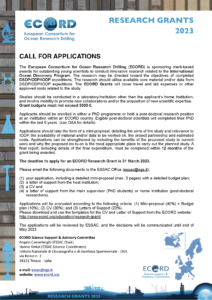The European Consortium for Ocean Research Drilling (ECORD) is sponsoring merit-based awards for outstanding young scientists to conduct innovative research related to the International Ocean Discovery Program. The research may be directed toward the objectives of completed DSDP/ODP/IODP expeditions. The research should utilise available core material and/or data from DSDP/ODP/IODP expeditions. The ECORD Grants will cover travel and lab expenses or other approved costs related to the study.
Studies should be conducted in a laboratory/institution other than the applicant’s home Institution, and involve mobility to promote new collaborations and/or the acquisition of new scientific expertise.
Grant budgets must not exceed 3000 €.
Applicants should be enrolled in either a PhD programme or hold a post-doctoral research position at an institution within an ECORD country. Eligible post-doctoral scientists will completed their PhD within the last 6 years. (see Q&A for details)
Applications should take the form of a mini-proposal, detailing the aims of the study and relevance to IODP, the availability of material and/or data to be worked on, the project partnership and estimated costs. Applications can be strengthened by including the benefits of the proposed study to current work and why the proposed ins.tu.on is the most appropriate place to carry out the planned study. A final report, including details of the final expenditure, must be completed within 12 months of the grant being awarded.
How to apply?
ESSAC issue a call for ECORD Research Grants on an annual basis. Applications should take the form of a mini-proposal, detailing the aims of the study and relevance to IODP, the material/data to be worked on, the project partnership and estimated costs. Applications can be strengthened by including the benefits of the proposed study to current work and why the proposed institution is the most appropriate place to carry out the planned study. A final report, including budget and some details of the anticipated results, must be completed within 12 months after the grant has been awarded.
To apply, you need to send the following documents to the ESSAC Office – essac@ogs.it:
- your application, including a detailed mini-proposal (max.5 pages) with a detailed budget plan;
- a letter of support from the host institution;
- your CV;
- a letter of support from the main supervisor (PhD students) or home institution (post-doctoral researchers).
Applications are evaluated by ESSAC according to the following criteria:
(1) Mini-proposal (40%) + Budget plan (10%);
(2) CV (30%);
(3) Letter of Support (20%).
OPEN CALL FOR ECORD RESEARCH GRANTS 2023
ECORD Grants Awardees 2019
Rudy Conte (University Venice; Italy): Integrated analysis of Contourite Depositional System (Ross Sea, Antarctica): linking sedimentary record and past ocean dynamics.
Dimitrios Evangelinos (University Granada, Spain): The evolution of the Antarctic Circumpolar Current during the last 28 million years
Natacha Fabregas (Bergen University, Norway): Sedimentology of the axis of the Corinth Rift during Marine Isotopes Stages (MIS) 5 to 7
Dakota Holmes (National University of Ireland, Ireland): A multiproxy approach to assess boundary conditions leading to abrupt high- magnitude climate events
Kasia Śliwińska (Geological Survey of Denmark and Greenland): Mid-Cretaceous climate in the High Arctic region
Tim van Peer (University of Southampton, UK): Reconstructing northwest Atlantic Ocean oceanography across the Oligocene-Miocene Transition using environmental magnetic techniques
ECORD Grants Awardees 2018
Max Casson (University of Manchester, UK): An integrated analysis of Mesozoic stratigraphy in the Central Atlantic region, implications for passive margin evolution
Johannes Monkebosch (University of Copenhagen, Denmark): Astronomical forcing of climatic changes during the late Jurassic – early Cretaceous
Katrina Nilsson-Kerr (The Open University, UK): Microanalysis of surface and thermocline dwelling foraminifera from the Bay of Bengal across MIS 5: Insights into seasonality and trace element signatures
Ornella Quivelli (University of Bari, Italy): Millennial – submillenial scale climate variability during Marine Isotope Stage 19: calcareous nannofossili and molecular biomarker evidence in the ODP Site 980 (North Atlantic)
Zeinab Smillie (Heriot-Watt-University, UK): Benthic foraminifera-based reconstruction of the Late Pliocene and Early Quaternary – Gulf Of Cadiz Contourite Depositional Systems
Antoine Triantafyllou (University of Nantes, France): Tracking Volatiles (C-O-S-H-Cl-F), Major and Trace elements contents of Primary Magma in Bonin Fore-Arc (Western Pacific)
ECORD Grant awardees 2017
Jakub Ciazela (University Hannover, Germany): Sulfide-rich interval discovered deep in the lower crust (U1473A, Atlantis Bank, SWIR)
Teresa Rodrigues (IPMA Lisbon, Portugal): Tracking climate dynamics across the Middle Pleistocene Transition, in mid-latitudes of the North Atlantic (CLIMAx)
Margot Crammwinckel (Utrecht University, The Netherlands): Reconstructing high resolution climate change across the Middle Eocene Climate Optimum of the Tasman Sea – a multiproxy approach
Madeleine Vickers (Plymouth University, UK): Southern high latitude climate during the Jurassic – Cretaceous: new evidence from clumped isotope thermometry
Man-Ying Tsan ( University Toronto, Canada): Iron sulfide analyses to assess microbially-driven sulfur cycling in high-temperature sediments (Nankai Trough, IODP Expedition 370, Site C0023)
ECORD Grants Awardees 2016
Bernhard Viehweger (MARUM, Germany): The subseafloor biosphere Download
Kim Alix Jakob (Heidelberg University, Germany): Late Pliocene/early Pleistocene threshold behaviour in the North Atlantic Download
Caroline Seyler (McGill University, Canada): Frictional properties of accretionary wedge sediments at the Cascadia margin Download
Sonja Felder (Newcastle University, UK): Applicability of the Mg/Ca palaeo-thermometer to the shallowmarine setting of Site U1427 in the Sea of Japan (IODP Exp. 346)
David King (University College London, UK): The Paragloborotalia mayeri-siakensis Conundrum: Planktonic Foraminifera Evolution and Extinction
Rui Zhao (University of Bergen, Norway): Microbial Life in basaltic and ultramafic rocks in oceanic crust
ECORD Grants Awardees 2015
James Barnet (University of Exeter, UK): Absolute sea-surface temperature estimates from the enigmatic late Paleocene greenhouse; new data from the Indian Ocean – Download
Montserrat Alonso Garcia: Tracking Mediterranean Outflow Water impact on North Atlantic circulation and climate during the initiation of the Northern Hemisphere glaciation
Mark Zindorf (Newcastle University, UK): Sulphur isotope study to reveal formation conditions of iron sulphides and deep sulphate enrichment – Download
Karen Gariboldi (University of Pisa, Italy): Role of Volcanic Ashes in Enhancing Primary Production: Evidences in the Deep Time
Sina Panitz (Northumbria University, UK): Investigating linkages between the Norwegian Atlantic Current variability and Scandinavian vegetation during the late Pliocene – Download
Rehemat Bhatia (University College London, UK): Can 2D trace elemental mapping of foraminifera help to resolve the presence of photosymbionts in the fossil record? – Download
Nina Jordan (University of Leicester, UK): Tephrochronogy on ODP Site 963 (Mediterranean Sea, ODP Leg 160) – Download
Soma Baranwal (The Arctic University of Norway): Timing of the onset of weakening of the Australasian rainfall in response to the global thermohaline circulation from the northwest shelf of Australia: IODP Expedition 356
ECORD Grant Awardees 2014
Lyndsey Fox (University of Leeds, UK): The Turning Point: Investigating coiling direction as a biostratigraphic tool
Angela Garcia Gallardo (University of Graz, Austria): Paleoceanographic changes in the Gulf of Cádiz during the late Pliocene – Report
Juliane Müller (AWI, Bremerhaven, Germany): Plio- and Pleistocene palaeoceanographic and environmental development in the Gulf of Alaska – Report
Clara Sena (University of Aveiro, Portugal): Stable isotopes: complementary data for assessing the biogeochemical cycling of elements in a forearc basin – IODP Expedition 351 – Report
ECORD Grants awardees 2013
Patten Clifford (Stockholm University, Sweden): The paragenesis and chemical composition of sulfide minerals in the oceanic crust: EMPA analysis of sulfides from IODP hole 1256D – Report
Sebastian Hammerschmidt: Gas Migration Pathways and Source Depths beneath the Kumano Forearc Basin, Nankai Trough, Japan
Katrien An Heirman: From micro to macro: Diagenetic and alteration processes on a grain-to-grain level in an active subduction zone
Claire Huck: Main and trace element concentration data and rare earth element patterns in fossil fish teeth from the Southern Ocean – Publication
Wendy Kordesch: Middle Eocene Carbonate Accumulation in the Deep Equatorial Atlantic: ODP Site 929
Marina Martindale (University of British Columbian, Canada): High-pressure melting relations of Juan de Fuca sediments and their effects on the Northern Cascade volcanic chemistry – Report
Iris Moebius (Goethe University Frankfurth, Germany): Temperature and stratification evolution across the Oligocene/Miocene transition in the western North Atlantic (IODP Expedition 342) – Report
Katherine Prentice: The role of ocean Productivity in Carbon Cycle Changes Through The Eocene/Oligocene Transition
ECORD Grants awardees 2012
Felix Genske (University Erlangen-Nürnberg, Germany): The petrology and geochemistry of lavas from the western Azores oceanic plateau – Report
Anna Joy Drury (Imperial College, UK): Onset and Termination of the Messinian Salinity Crisis: constraining variation of bottom water temperatures, ice volume and sea level – Report
Sara Lafuerza (IPG-Paris, France): New insights on submarine flank volcano evolution from geomechanical characterization of marine sediments, west of Martinique – Report
Gabrielle Rousselle (University Pierre and Marie Curie, France): Contribution of TEX86-based temperatures to the climatic variations of the equatorial Pacific during the last 10 Myrs – Report
ECORD Grants awardees 2011
Mirjam Koch (University of Frankfurt, Germany): Late Pliocene millennial scale fluctuations in SST and stratification within the North Atlantic – Report
Cristina Sghibartz: Records to understand controls on the deepening calcite compensation depth across the Eocene Oligocene Transition
Cristian Zeeden (Utrecht University, Netherlands): Studying phase relations of orbital forcing and terrestrial (ice) response in the Miocene – Report
Borje Dahren: Unraveling the lithostratigraphy of the continental crust beneath the Faroe Islands
ECORD Grants awardees 2010
Torsten Haberzettl: Investigating a ÒnewÓ Late Pleistocene paleomagnetic excursion: research on ODP Leg 151 Site 911 Hole C Core 1H
Valerio Pasini: Biopetrology of the hydrating mantle along Mid Ocean Ridge
Zuzanna Natalia Stroynowski: IODP Exp. 323, Bering Sea
Jan Hennisen


